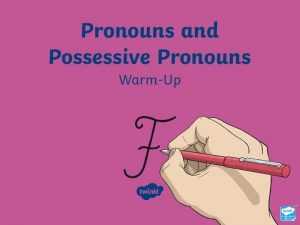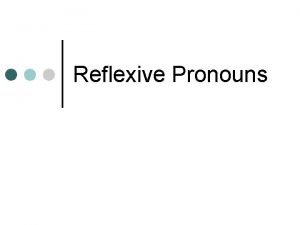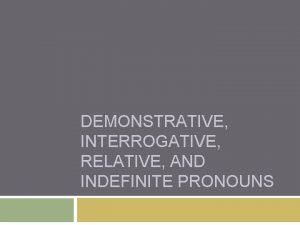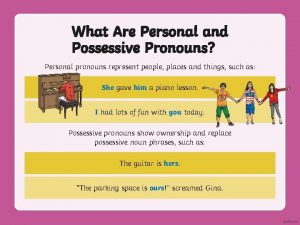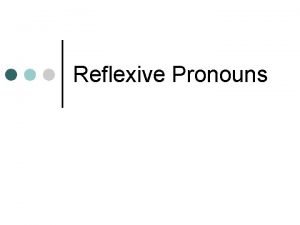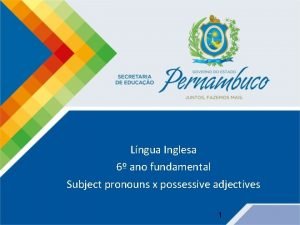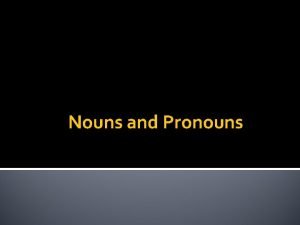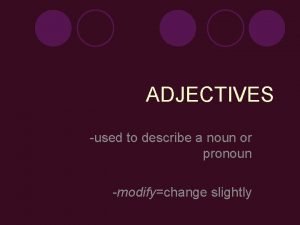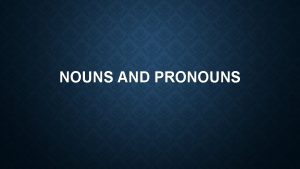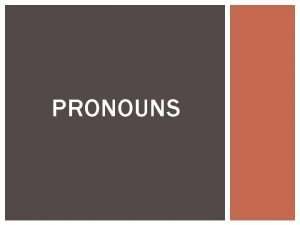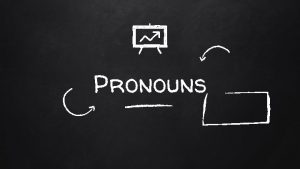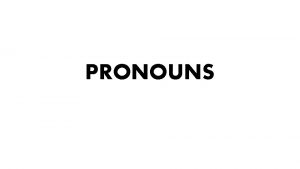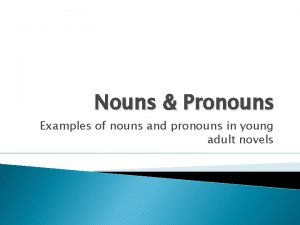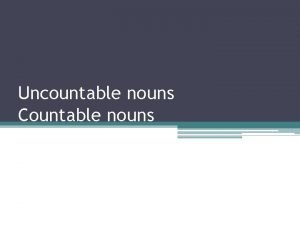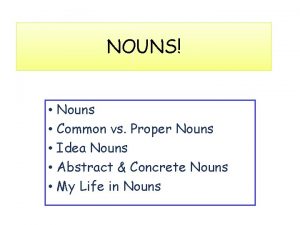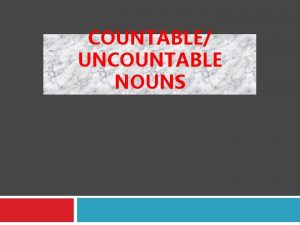CH 16 Nouns and Pronouns Test Review Nouns










- Slides: 10

CH 16 Nouns and Pronouns Test Review

Nouns • What is a noun? – It’s a name of a person, place, or thing/idea. • Identifying nouns: 1. sing/toddler/musician 1. toddler; musician 2. school/library/thought 1. school; library 3. misery/rusty/success 1. misery; success

Common Noun vs. Proper Noun • What’s the difference? • Identifying proper from common: – Common nouns name ANY person, place, 1. agana/village/town thing/idea. – Proper nouns name SPECIFIC person, place, thing/idea; ALWAYS capitalized. 1. Agana (proper) 2. season/christmas/holiday 1. Christmas (proper) 3. pet/dog/laura 1. Laura (proper)

Pronouns and Antecedents • What are pronouns (personal pronouns)? – Replacement words for nouns to help avoid repetition. • What is an antecedent? • It’s the word being replaced by the pronoun.

Let’s practice identifying the antecedents… 1. Susan bought herself a new blouse at the sale. 1. Susan 2. The boat with the red sail is the one that won. 1. boat 3. The governor wore a black suit to his inauguration. 1. governor 4. This is not the CD I ordered. 1. CD 5. Joe asked his father to help build the tree house. 1. Joe

Reflexive vs. Intensive • Helpful tip – Always identify the pronoun first. Reflexive and intensive pronouns ALWAYS end in –self or –selves. • Reflexive adds information to the sentence and points back to the noun/pronoun. • Intensive adds emphasis to the noun. – They’re usually not necessary in sentences.

Let’s practice identifying reflexive and intensive… 1. I myself have never questioned Martin’s loyalty. 1. myself; intensive 2. Tricia has always taken good care of herself. 1. herself; reflexive 3. Helen wallpapered her bedroom herself. 1. herself; intensive 4. We all enjoyed ourselves at the picnic. 1. ourselves; reflexive

Demonstrative, Relative, and Interrogative Pronouns • Demonstrative – “Demonstrate”; point out or direct attention to something • Relative – “Connection”; brings two clauses together to make a sentence • Interrogative – BEGINS the question

Practice for Demonstrative, Relative, and Interrogative Pronouns 1. Is that the jacket with a broken zipper? 1. that; demonstrative 2. Whose baby is crying so loudly? 1. Whose; interrogative 3. The person to whom Sally is writing is named Franklin. 1. Whom; relative 4. Jake has a pen pal who lives in New Guinea. 1. who; relative 5. Are those the apple trees Fiona mentioned earlier? 1. those; demonstrative

Indefinite Pronouns • Indefinite pronouns do not always have an antecedent. • Practice 1. Costumes are showy, and some include large headdresses. 1. some; costumes 2. Eventually, somebody working for the Eli Bridge company started making portable Ferris wheels. 1. somebody
 Personal pronouns and possessive pronouns
Personal pronouns and possessive pronouns Possessive interrogative pronoun
Possessive interrogative pronoun Reflexive pronoun
Reflexive pronoun Interrogative and demonstrative pronouns
Interrogative and demonstrative pronouns Circle the demonstrative pronoun in each sentence
Circle the demonstrative pronoun in each sentence Personal pronoun possessive
Personal pronoun possessive Reciprocal pronouns exercises
Reciprocal pronouns exercises Reflexive pronouns definition
Reflexive pronouns definition Subject pronouns 6 ano
Subject pronouns 6 ano Y8
Y8 Used to describe nouns and pronouns
Used to describe nouns and pronouns
